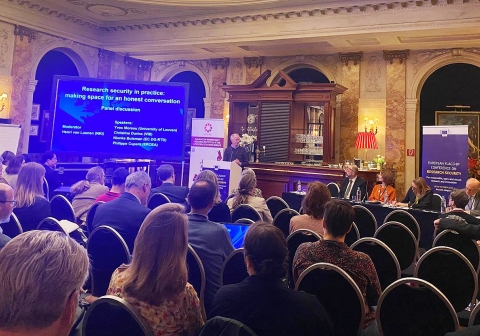The judges’ thoughts on our essay competition: an alarming insight into what a better world of science looks like
The EU-LIFE/Nature essay competition has revealed that researchers are less interested in the far future, and more concerned about their present.
By Jack Leeming, Frances M. Brodsky, Carolina Mangana, Emmy W. Verschuren, Giulio Superti-Furga
When we launched the Utopia Institute of Research essay competition as part of the EU-LIFE tenth anniversary celebrations, we had an idea of what to expect. We kept our instructions simple: send us pieces shorter than 1000 words, imagining an ideal research institute. We anonymised the essays, and judged them using a points system. We were all equal judges in this process.
What we hoped for was bold, imaginative and ambitious pieces from scientists around the world, seeing far into the future of science and scientific life to determine what the world would be like 50, 100, 200 years or even a millennium from now. We hoped to discover radically different forms of governance or organisation. We anticipated pieces on people who lived forever, or on a different planet, or what was left to investigate when there was nothing else to discover. We published our call for submissions, sat back, and awaited the unleashed imagination of the scientific community.
What we received was far more sober: less of a dream, and more of a howl against the most pressing barriers faced by many in science today.
The 326 essays we read dealt less with visions of the future, and more around what researchers struggle with today. Our writers built institutes that had eliminated racism, sexism, or excessive paperwork. Many Utopias had eradicated the Tantalusian grasping for funding that seems to rob so much time and energy away from the actual act of science.
When there was hope for the future, it was cautious, cagey and careful: we read about academic worlds with work-life balance, or that were energetically sustainable, environmentally friendly or embedded in the community. We received pieces that explored the idea that genuine collaboration and human relationships were celebrated, accommodated and respected. Such a world, our authors felt, was utopia enough for them.
This, we feel, is a wake up call. One where we are jolted into the present moment and confronted with the constraining system we have created. Fanciful, multicolour utopias are too distant: scientists need more, now. They don’t have the time or the inclination to dream of a far-off future.
Our winner is a piece set in Edinburgh, UK, and wonderfully penned by Katherine Ember, a research associate and biomedical scientist at the Polytechnique Montreal in Canada. In it, a character cycles to work, conducts analysis on a sample from the local area, and takes action to change the world around them.
It’s a simple story written around a small moment. The utopic element comes from a scientific institute communally embedded in society for the betterment of all. Here, just south of Scotland’s capital city and 30 years in the future, science is purposeful, efficient, and human.
In addition to Ember’s piece, we’re also very pleased to present two formal runners up. The first, by Miles Elliot Lizak, is set in the magical-realist ‘Stupid Questions Office’. Evandro Ferrada wrote the other, which cleverly uses an interview transcript to show progress in society – both in diversity in leadership and in transitioning to green energy. Lizak is a biochemist and writer based in Barcelona, Spain. Ferrada is a researcher at the Research Center for Molecular Medicine in Vienna.
Despite the bleak tone of many of the essays we reviewed, there was also a sense of hope. Yes, most of the authors were embattled; but they were also convinced that change was not only possible, but not too far away. The ending of Ember’s essay summarizes this:
“This is where our scientific utopia must be built. Not in the perfect future but in the imperfect now."
The three best essays of the contest are published in Nature:
- Katie Ember (best essay): https://www.nature.com/articles/d41586-023-01855-8
- Miles Elliot Lizak (runner-up): https://www.nature.com/articles/d41586-023-01856-7
- Evandro Ferrada (runner-up): https://www.nature.com/articles/d41586-023-01854-9
Authors of this article:
- Jack Leeming is a careers editor at Nature in London.
- Frances Brodsky is a professor of cell biology at University College London.
- Carolina Mangana is a poet and predoctoral fellow at the Research Center for Molecular Medicine in Vienna.
- Emmy Verschuren is an associate professor of cancer biology at the Institute for Molecular Medicine in Helsinki.
- Giulio Superti-Furga is the scientific director of the Research Center for Molecular Medicine in Vienna.



